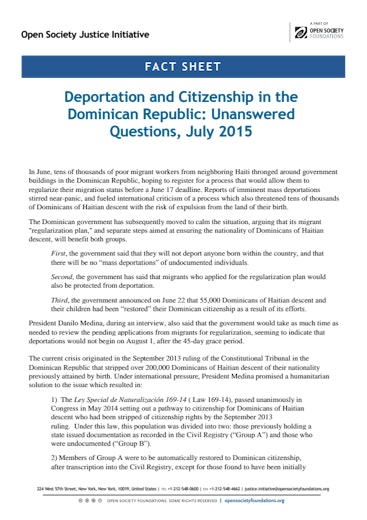Deportation and Citizenship in the Dominican Republic: Unanswered Questions
In June, tens of thousands of poor migrant workers from neighboring Haiti thronged around government buildings in the Dominican Republic, hoping to register for a process that would allow them to regularize their migration status before a June 17 deadline. Reports of imminent mass deportations stirred near-panic, and fueled international criticism of a process which also threatened tens of thousands of Dominicans of Haitian descent with the risk of expulsion from the land of their birth.
The Dominican government has subsequently moved to calm the situation, arguing that its migrant "regularization plan," and separate steps aimed at ensuring the nationality of Dominicans of Haitian descent, will benefit both groups.
First, the government said that they will not deport anyone born within the country, and that there will be no “mass deportations” of undocumented individuals.
Second, the government has said that migrants who applied for the regularization plan would also be protected from deportation.
Third, the government announced on June 22 that 55,000 Dominicans of Haitian descent and their children had been “restored” their Dominican citizenship as a result of its efforts.
President Danilo Medina, during an interview, also said that the government would take as much time as needed to review the pending applications from migrants for regularization, seeming to indicate that deportations would not begin on August 1, after the 45 day grace period.
The current crisis originated in the September 2013 ruling of the Constitutional Tribunal in the Dominican Republic that stripped over 200,000 Dominicans of Haitian descent of their nationality previously attained by birth. Under international pressure, President Medina promised a humanitarian solution to the issue which resulted in:
1) The Ley Special de Naturalización 169-14 (Law 169-14), passed unanimously in Congress in May 2014 setting out a pathway to citizenship for Dominicans of Haitian descent who had been stripped of citizenship rights by the September 2013 ruling. Under this law, this population was divided into two: those previously holding a state issued documentation as recorded in the Civil Registry (“Group A”) and those who were undocumented (“Group B”).
2) Members of Group A were to be automatically restored to Dominican citizenship, after transcription into the Civil Registry, except for those found to have been initially included as a result of fraud. The government said on June 22 that 55,000 people had benefitted from this process.
3) Members of Group B (individuals born in the Dominican Republic but who remained undocumented) were to apply for naturalization after a two year waiting period during which they would be considered foreigners. 8,755 persons had applied by the February 1 deadline set out for Group B. The number of people potentially eligible for this process who did not register is estimated by rights groups to be far higher, possibly over 100,000. Those from Group B who did not register are now at risk of statelessness as a result of being unable to access citizenship. We are concerned that the process of proving birth in the Dominican Republic has been overly burdensome, requiring extensive use of legally-certified affidavits that has made the process inaccessible to low-income people.
Running almost concurrently to this plan aimed at Dominicans of Haitian Descent was the Plan Nacional de Regularización de Extranjeros (known as the Regularization Plan), aimed at migrants who were born outside the Dominican Republic. The government says 288,466 people applied for documentation as migrants by the June 17 deadline. Shortly before the deadline, the government announced a grace period of 45 days following June 17 during which applicants could complete their files and the government will review and take a decision on all the applications by August 1. This was widely believed to also be the date when deportations would begin happening.
Despite the assurances issued so far by the Dominican Republic, several questions regarding the status of Dominicans of Haitian Descent remain unanswered:
- Under the current law, people born in the Dominican Republic who do not have Dominican birth certificates (Group B) have to register, and then wait for 2 years to apply for naturalization. The government says that only 8,755 people had registered to be considered for citizenship under Law 169-14 by the February 1, 2015, deadline. Given the large numbers of people from Group B eligible for this process who did not register, possible over 100,000, what steps will the government take to ensure they are not deported?
- What happens to people from Group B if they are denied naturalization after the 2 year waiting period? What will be their status in the country?
- What is the status of children born in the Dominican Republic to parents without valid Dominican documents after 2010 (previously they had the right to Dominican nationality)?
- Unscreened deportations by the DR of undocumented migrants to Haiti have in the past led to the expulsion of Dominicans of Haitian descent who often lack birth documentation (one out of every five children under the age of 5 has no form of birth registration, according to UNICEF). What kind of screening will be established to ensure that Dominicans of Haitian descent are not inadvertently expelled to Haiti once the deportations of undocumented migrants resume? What process or mechanism is available if someone born on the Dominican Republic’s territory finds themselves expelled into Haiti?
- How will the Dominican Republic ensure due process for undocumented migrants in the deportation process? What possibilities will be available for challenging deportation orders?
- How many of the 55,000 people with Dominican birth certificates (Group A), whose citizenship was confirmed by Law 169-14, have collected their documents? What are the specific steps they must follow to obtain their documentation?
Topics
- Climate Justice
- Digital Rights and Fair Elections
- Discrimination and Racial Justice
- International Crimes
